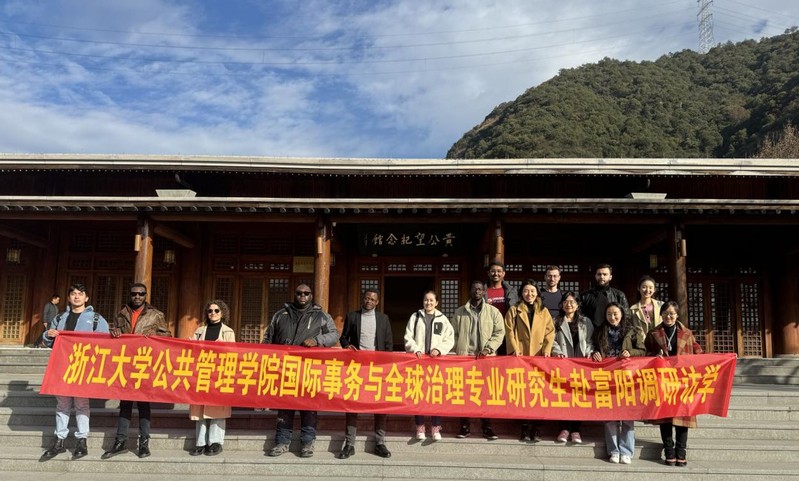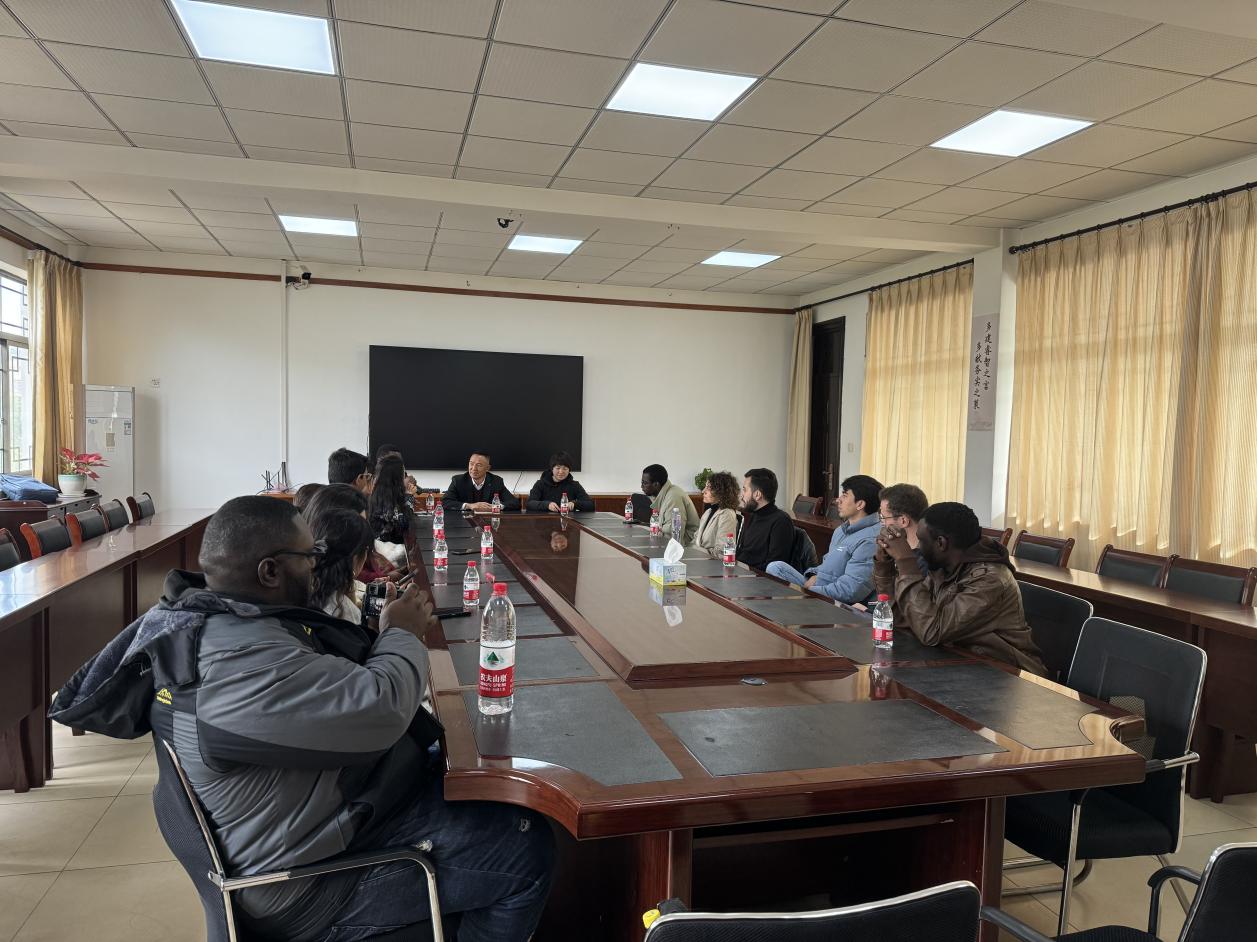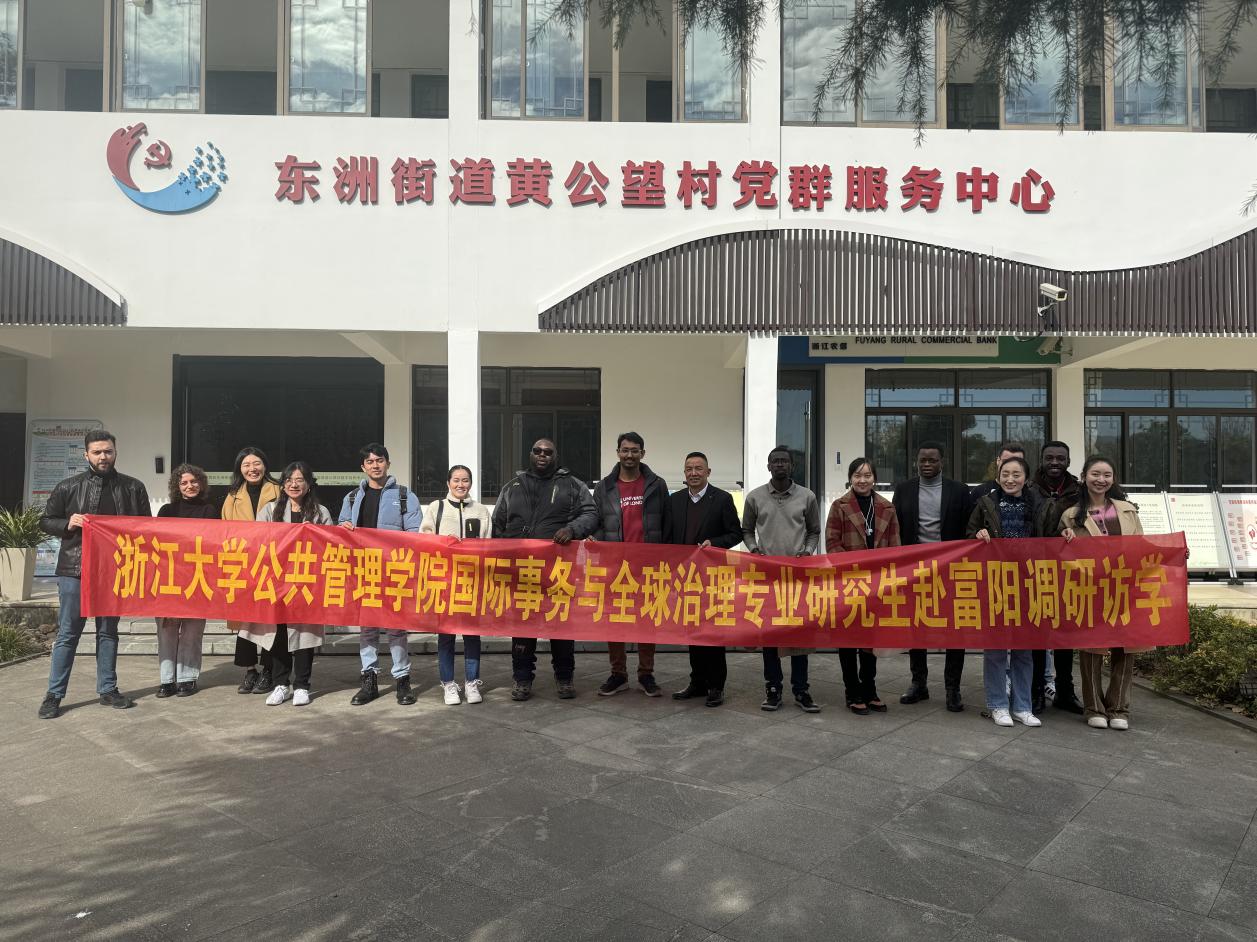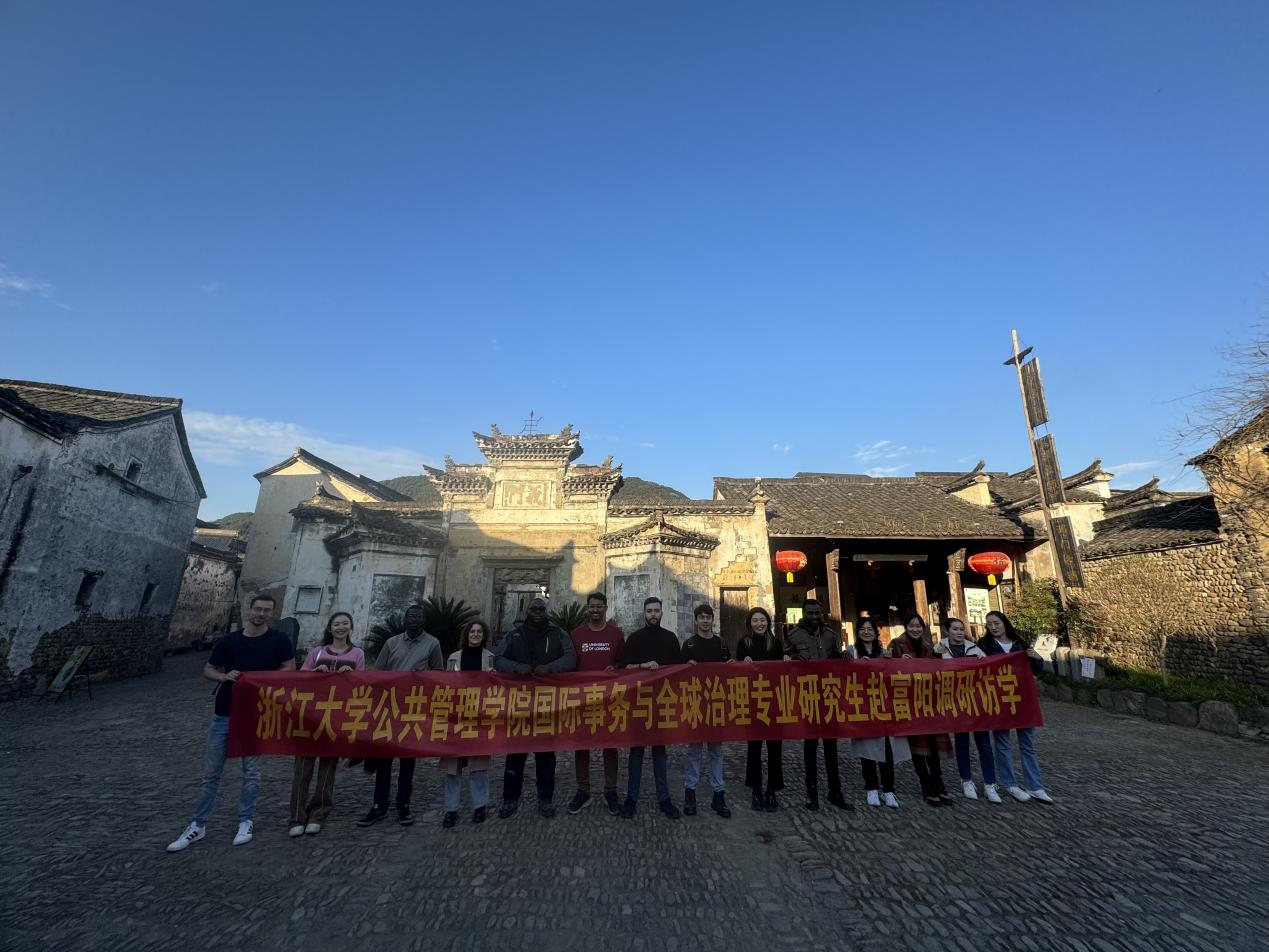2023年12月9日 ,浙江大学公共管理学院的国际事务与全球治理专业研究生组织了一次实地调研,目的是深入了解中国的传统文化与地方治理。这次调研地点包括杭州市富阳区东洲街道的黄公望隐居地、黄公望村和龙门古镇。来自12个国家的15名同学通过实地走访、与当地治理人员的面对面交流,对中国传统文化古迹的传承保护和浙江的基层治理有了更深入的了解。
在黄公望隐居地,学生们分别探访了记载了黄公望生平与临摹版《富春山居图》的黄公望博物馆和黄公望数百年前隐居的“小洞天”。底蕴深厚的黄公望生平、中国古代的笔墨纸砚让留学生对中国历史、中国古典艺术与自然景观之间的和谐关系有了更直观的了解;优美的景色、保护完好的故居更是让留学生们亲身体验了这位元代著名画家的生活和艺术足迹。

黄公望村是此次调研的重点。在这里,同学们有幸能够与黄公望村的党支部书记进行了深入的座谈。书记首先介绍了黄公望村的基本情况,包括历史背景、经济发展现状等,随后就学生们提出的基层治理难题、教育资源分配、产业结构、人才吸引等方面进行了一一解答。在书记细致的介绍中,学生们更直观地了解了中国基层治理的全貌。短短四十分钟的时间让大家收获颇丰。


下午,同学们来到了中国江南最大明清古村落之一、孙权故里龙门古镇。在这里,学生们品尝了当地有名的特产如酒酿馒头、梨膏等,走访了具有独特建筑风格的老街、祠堂。在这里,同学们感受到了中国传统文化与现代生活的交融。古镇保留了许多历史建筑和文化遗址,同时也融入了现代元素,成为研究传统与现代如何共存的绝佳案例。
这次调研活动让同学们感受颇深。
The Trip to Fuyang, a district in Hangzhou that holds great significance in preservation of ancient beauty and cultural heritage, showcased a great deal to our interest.
On the Fuchun Mountain is the studio and former dwelling place of the famous Artist, Huang Gongwang. This site in modern days, is a famous tourist spot with displays of incredible works of art. Huang Gongwang village was named after the great artist, by the people, whom also made the Huang Gongwang memorial Hall, that attracts tourists today. With the village administration focused on building a modernized village, many developmental issues have seemed to be surmounted. Our next stop at Longmen Town, was intriguing with beautiful sites and sights of historical phenomena that concerned the locals.
It was yet another beautiful and wonderful investigation.
——Agbaji Solomon Ugbede
The trip to Fuyang District in Hangzhou was a great learning experience. In this place, one can appreciate a harmony between nature and sustainable development. One of the things that caught my attention was the way the local and national governments protect the historical wealth of their ancestors, reflecting an appreciation for culture. Another wonderful destination is the village of Longmen, which took me on a journey back in time. The beautiful old buildings there are a testament to China’s rich art and history. The local community offers typical artisanal cuisine that can be enjoyed with a peace of mind. In conclusion, these two destinations showcase China’s great cultural diversity and the warmth of its people.
——Daniel Salamanca
Our trip to the Fuyang District was a good experience. From it I was able to gain a good first hand experience of being able to see up close how much development has taken place. The city has undergone massive restructuring and we were able to see how the elderly were strategically relocated and the joining of three small towns into one. The ancient town is a thriving one and the lives of the people living there have been improved tremendously as the city is very clean and unpolluted with amenities such as a subway that runs throughout the city and filled with semi modern nightlife activities .
——Emmanuel Mayanja
This field trip has deepened our understanding of rural Zhejiang's socio-economic dynamics, offering fresh insights into key questions related to grassroots governance, rural economy, and the enhancement of rural livelihoods. I was greatly inspired by Huanggongwang village. The village's origin, influenced by the artistic legacy of Huang Gongwang, has transformed it into a cultural tourism hub, attracting entrepreneurs from the Cultural Creative Industries and improving local employment. The lush Fuchun Mountains and the Fuchun River, along with proactive local government efforts, drive the village toward a "beautiful economy." This approach seeks a balance between socio-economic progress and environmental sustainability, utilizing modern technologies. The insights gleaned from Huanggongwang village bear resonance with the broader rural development initiatives in Zhejiang, particularly in their aspiration to construct a "beautiful countryside."
——Eric Mopuna
The investigation trip to Fuyan was highly informative and well organized.
In the morning we were able to see a copy of Huang Gongwang's masterpiece "the Dwelling in Fuchun Mountain", learn about his life and the intricate history of his most famous painting. While walking among the quiet mountains and bamboo forests, we also saw what his house and studio were like.
Afterwards, we took part in a very informative meeting to find out more about how Huanggongwang village is governed, what its economy is based on and how the village attracts young people.
Finally, in the afternoon we visited the beautiful historical town of Longmen, incredibly well preserved and fascinating. The icing on the cake of this wonderful trip.
——Giulia Spitalieri
Although Fuyang District is one of the far urban areas of Hangzhou, the comprehensive economic strength of Fuyang District is in the forefront of the major districts and counties in Hangzhou. In 2022, the total GDP of Fuyang District exceeded 91.7 billion yuan. According to the average local registered population in Fuyang District, the per capita GDP of the city is over 131,000 yuan, and Fuyang District is regarded as one of the most economically developed areas in China. And the per capita disposable income of urban residents in Fuyang District exceeds 71,700 yuan, and the per capita disposable income of rural residents has also reached 44,600 yuan.
The reason for Fuyang's economic prosperity lies not only in the sales of local specialties and other primary industries, but also in the development of tourism industry driven by beautiful natural environment and cultural heritage.
Huang Gongwang, a great painter in the Yuan Dynasty, lived in seclusion by the Fuchun mountain and created the famous painting "The Dwelling in Fuchun Mountain". Therefore, Fuyang is also the original and real scene of Huang Gongwang's "The Dwelling in Fuchun Mountain". Fuyang area numerous scenic spots, with Hangzhou wildlife world, longmen town, Fuchun Taoyuan national AAAA level tourist area, as well as the new sand island, Huang Gongwang seclusion, stork mountain, day zhong shan, ancient Chinese paper printing culture village, fuchun mountain international golf course, yongan mountain national paragliding training base and other natural cultural attractions.
In addition, in the conversation with local officials, what impressed me deeply was that there was no concern about population aging in Fuyang District. More than 65 years old accounts for just about 25% of the population in the total support area, and young people born in livable areas have good reasons not to leave their hometown. Because golf courses, coffee shops, homestays and other places to start businesses or work are abundant.
Fuyang District seems to be a model of local cities, which not only has superior natural environment, but also has achieved economic success. This visit was a very rewarding experience. Through visiting the beautiful natural environment, cultural sites and communicating with local civil servants, we learned about the reasons for local economic growth!
——JUNG SOYOUNG
The Fuyang district trip in Hangzhou was an incredibly informative and enjoyable experience. Visiting Fu Chun Mountain and the museum to see the 7-meter-long painting of Fu Chun Mountain was truly amazing. Longmen village, with its picturesque mountains and charming traditional houses, offered a delightful glimpse into rural Chinese life. The local lunch feast was a culinary delight, and the famous beef dishes for dinner were a perfect end to the day. The well-organized trip provided a perfect blend of cultural enrichment and natural beauty, and I am grateful for the opportunity to have experienced something new.
——Munkhtsetseg Batbayar
A one day trip to Fuyang is a good opportunity to discover this part of Zhejiang province. During the first part of the day, we had the occasion to discuss with the local authorities of the Huanggoongwang Village. In this discussion, the responsible told us about how the community is structured and how disputes used to be solved. In the afternoon, we went to Longmen Town, an ancient Zhejiang village, which was able to preserve significant parts of its historical architecture and village structure.
——Niko Wilmer
The reason I decided to study abroad was because I wanted to know and feel more about China and interact with more Chinese and international students. This research activity was a perfect fit for my purpose of studying abroad in China.
The best part was meeting new good friends. I am so grateful to the friend who planned this research activity, the friend who contacted me, and everyone who kindly welcomed me. I was with great people, and the weather, food, and scenery were all perfect.
It was an opportunity to build knowledge. Hwanggongwang’s masterpiece was very impressive. The image of Hwanggongwang in the painting, the owner who wanted to keep the painting after his death, his nephew who left the masterpiece for future generations against his uncle’s will, and even a symbol of the harmony between the mainland China and Taiwan... It was also impressive that Hwanggongwang Village’s digitalization and it did not experience problems such as aging or population decline. It was also nice to take a walk through Longmen Town, where Sun's family has lived for generations and where the Ming Dynasty architecture has been preserved.
It was a great experience for my life in China.
——You-Jeong SEO徐侑廷

此次实地调研是国际事务与全球治理教学课程的重要组成部分。通过亲身体验和实地考察,同学们不仅增强了对中国传统文化的理解,也对当代中国地方治理、社区发展等现实问题有了更深入的认识。浙江大学公共管理学院将继续致力于提供这种实地学习的机会,为学生们构建一个全面、多元的学习平台。
图 /文 陈艺珂

